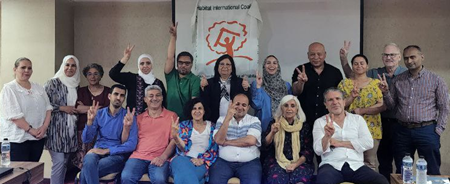Land Forum VIII: Remedies for Displacement

Over 11–12 May, HIC-HLRN organized the eighth session of its Middle East and North Africa (MENA) regional Land Forum at Istanbul, Türkiye, under the theme “Remedies for Protracted Displacement due to Conflict and Climate Change.” The Forum sought to align participants’ organizations` programs related to land and natural resources management, and to unify efforts in favor of restoring housing, land and property rights for victims of forced displacement in the region. The approach identified holders of rights to remedy and the other corresponding norms, tools and techniques to achieve synergy and cooperation among them to that end.
This latest round of the HIC-HLRN Land Forum took place amid the horrific events and grave challenges facing peoples of the countries of MENA region, from the COVID pandemic to the current state of armed conflicts in several countries of the region, including the conflict in Sudan and the crime of genocide to which Palestinian civilians they have been subjected under Zionist colonialism in the Gaza Strip since 7 October 2023. Meanwhile, climate-change events have contributed to long-term mass displacement and violation of the human rights to housing, land and property of the displaced and refugees in the region.
Therefore, HIC-HLRN assumed the duty to convene this eighth session of the regional Land Forum with the Members, partners and friends and allies of the Coalition in the region from (Egypt, Iraq, Iran, Jordan, Lebanon, Palestine, Tunisia, Sudan, Syria, Western Sahara and Yemen). They updated action plans to pursue jointly and individually in a coordinated program to advocate positive change across the MENA region. Their collaboration focused on two high priorities: (1) assessing and remedying costs, loss and damage associated with climate change and (2) housing, land and property (HLP) restitution for refugees and displaced persons across the region.
Despite the scarcity and limited nature of such opportunities at the national level, the 24 participants (physically and virtually) deliberated a set of general objectives for cooperation to remedy the long-term displacement crisis, namely:
- Develop the regional Land Forum process as a platform to guide research, assessments, field operations and advocacy to resolve crises with a human rights-based approach;
- Update and exchange knowledge and information on a range of relevant regional and global processes currently underway;
- Provide analytical tools for relevant civil society actors to monitor and evaluate global policy commitments related to land (e.g., Paris Agreement, 2030 Agenda and the “New Urban Agenda”);
- Establish a base for the activities of the active members of the Habitat International Coalition for the period 2024–27.
During the first day, the participants reviewed both rural and urban costs, loss and damage associated with climate change in the most-affected countries in the region, in addition to the HIC-HLRN methodology and tools for monitoring climate finance and quantifying costs, loss and damage. The second day focused on HLP restitution for refugees and displaced persons in the MENA region, with its 40 million persons eligible for reparation for the abuse they have undergone. The participants agreed that the displacement and refugee crisis is a global responsibility, often fulfilled locally, which requires the involvement, support and strengthening of local solutions coordinated across all spheres of government in the region.
The discussion explained that the most important obstacles facing any regional initiative to address the assessment of costs, loss and damage is to integrate human rights-based approaches to land, housing and development into the new UNFCCC Fund for responding to Loss and Damage (FLD). And, for this, and the participation of civil society is indispensable, especially since it can share the expertise and community-based information from affected communities community-led data collection.
The participants discussed how the genocide waged against the Palestinian people in Gaza, and the expulsion and apartheid that Israel has imposed against the Palestinians in historic Palestine and the West Bank under Zionist occupation have targeted homes and properties and forcibly displaced the Indigenous Palestinian People over decades. HLRN Coordinator Joseph Schechla stressed the importance of continuous cooperation among civil society and international institutions to expose these illegal practices in all international reports, not least to document these crimes for the remedial purposes (reparation of victims, prosecution of perpetrators) for which they were codified.
In the last session of the Forum, the participants discussed prospects for cooperation and joint strategies, presenting a set of recommendations to be worked on during the coming period, including:
- Develop a legal guide for litigation to support affected communities facing displacement due to climate change and conflict;
- Operate truth-telling committees and community dialogues to achieve real transitional justice, including accountability and reparations;
- Pursue a restorative justice approach that integrates the victim groups into the peacebuilding and institutional-reform processes (within the rubric of transitional justice);
- Form a legal working group that contributes to building and strengthening legal frameworks with the human rights approach to remedy loss and damage from climate change; conflict, occupation and war; prolonged displacement across the countries of the region;
- Further develop the gender dimension and gender equality in loss and damage with parties to the FLD.
For further details download the full report [AR].
Review the previous rounds of Land Forum: The Land and Its People: Civil Society Voices Address the Crisis over Natural Resources in the Middle East/North Africa.
|